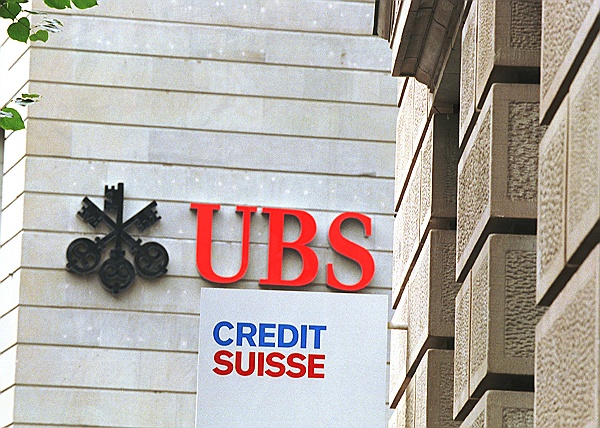Swiss banks pass tougher stress tests

Big Swiss banks have been backed to withstand future financial shocks on the same day European rivals received mixed reviews from a “softer” stress test.
UBS and Credit Suisse are deemed to be more resilient to stock market plunges and national debt defaults than some other European banks, according to separate reports by Swiss and European Union regulators.
The EU and the Swiss Financial Markets Supervisory Authority (Finma) both released the findings of their stress tests on Friday. Both measured the ability of banks to survive sudden economic crises, but Swiss banks were only included in the Finma test that has been periodically applied to Swiss banks since 2008.
All but seven of 91 European banks passed the EU stress test, the results of which aim to restore confidence in the banking system’s ability to weather the continent’s debt crisis. Those jitters could grow on when markets open on Monday if investors feel the tests were too soft.
“The stress tests do not seem that stressful,” said Neil MacKinnon, global macro strategist at VTB Capital. “It is looking more like a political whitewash rather than a genuine attempt to reassure financial markets.”
Christine Lagarde, France’s finance minister, defended the tests, calling them “tough” and “very comprehensive” with “very credible” results.
Twice as tough
The set of 13 worst-case scenarios Swiss regulators used were far more strenuous than those applied by the EU, according to Credit Suisse chief financial officer Renato Fassbind, speaking at the bank’s second-quarter results meeting in Zurich on Thursday.
“Our estimate is that the Finma tests are more than twice as severe as the EU stress tests,” Fassbind said. “We believe that if we were subjected to similar EU stress tests we would remain one of the best capitalised banks in the world.”
The stress test results will attract intense scrutiny for signs of banks that could fold if the shaky economic global foundations give way again. Among the EU’s losers were five small Spanish savings banks, called cajas, Germany’s Hypo Real Estate Holding, and Greece’s ATE bank.
Ahead of the curve
Despite a settling down of the mortgage-back securities and bank liquidity problem that sparked the crisis in the first place, plenty of potential pitfalls remain as countries scramble to repair their battered finances.
The most pressing of these is a fear that some European countries, most notably Greece, could default on government debts. Nervous glances have also been cast at some eastern European emerging economies that were popular investment markets before the crash and have suffered more than most countries during the global recession.
The financial crisis, culminating in the collapse of US bank Lehman Brothers in 2008, sparked a rush by many countries to impose greater restrictions on banking operations in an effort to avoid a repeat scenario.
Proposed tightening of regulations have centered on increasing the size of assets banks must keep in reserve to buffer against losses, improving the quality of those assets and restricting the amount of debt (leverage) banks use to conduct their business.
Other aspects to come under the regulatory microscope have been restricting bonuses and the counter-party exposure banks have to the potential liabilities of rivals.
In this respect, Switzerland has been ahead of the curve, already demanding tougher conditions for its two main banks, UBS and Credit Suisse, back in 2008.
“Swiss banks are quite resilient and have been traded as safe havens in the last few months,” Bank Sarasin analyst Daniel Bischof told swissinfo.ch. “They have low exposure to southern European countries [such as Greece], above average liquidity and high capital ratios.”
Matthew Allen, swissinfo.ch
Switzerland has traditionally applied tougher regulations than other countries because its financial sector accounts for a bigger slice of the country’s economic output.
Consequently, the impact on the Swiss economy would be more severe if a big bank were to fail.
Before the financial crisis, UBS and Credit Suisse were required to hold 20% more reserves as a buffer against losses than the international standard – a more conservative stance known as the Swiss finish.
At the end of 2008, Swiss regulators tightened up their requirements in relation to the two big banks and other financial institutions.
From 2013, UBS and Credit Suisse will be obliged hold double the international standard of capital reserves in good times, falling to at least 50% extra during difficult times.
In addition, restraints will be placed on the amount banks can borrow to fund their activities and their exposure to the potential liabilities of other banks.
Finma has already applied conditions to the award of bonuses to banking staff. Part of such bonuses must be deferred and linked to long-term targets before they can be paid out (both UBS and Credit Suisse had already applied similar in-house policies on a voluntary basis).
Earlier this month, the US introduced wide ranging reforms to give regulators more power to rein in banks.
EU finance minister have also agreed to a tough new set of measures to stop the financial sector spiraling out of control again.
The Swiss-based Basel Committee on Banking Supervision has just finished a final draft of their latest international regulations, known as Basel III. The new regulations would largely match the Swiss rules introduced in 2008.

In compliance with the JTI standards
More: SWI swissinfo.ch certified by the Journalism Trust Initiative





You can find an overview of ongoing debates with our journalists here. Please join us!
If you want to start a conversation about a topic raised in this article or want to report factual errors, email us at english@swissinfo.ch.